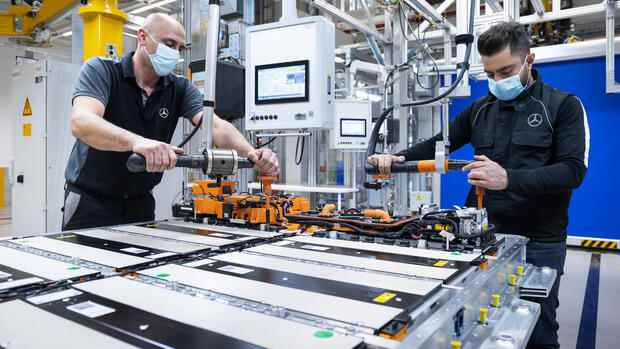Aside from the production in Untertürkheim, capacities for the recycling of batteries from electric cars are being created – and also funded by the federal government.
(Photo: Daimler AG)
Berlin The Federal Ministry of Economics is promoting the development of a holistic recycling approach for lithium-ion batteries. On Tuesday, Mercedes-Benz AG and its project partners will receive the corresponding funding notification. In addition to Mercedes-Benz, project partners include Daimler Truck AG, various other companies and several research institutions, including the TU Clausthal and the TU Berlin.
The aim of the project, which the project partners have dubbed “LiBinfinity”, is to set up a pilot plant for battery recycling, which should enable an efficient circular economy of battery materials. At 17 million euros, the funding is manageable; nevertheless, efficient battery recycling is regarded as a key to the long-term success of electromobility.
So far, there are many unanswered questions in battery recycling. The development of recycling capacities and the recovery of raw materials from lithium-ion batteries are of central importance for electromobility, said Michael Kellner, Parliamentary State Secretary in the Federal Ministry of Economics.
In the funded project, a mechanical-hydrometallurgical process is being developed that completely dispenses with energy-intensive process steps. The pilot plant is being built at the Mercedes-Benz site in Kuppenheim and will have an annual capacity of 2,500 tons.
The funding of the project is part of a measure with various projects related to research into battery cell production.
Top jobs of the day
Find the best jobs now and
be notified by email.
>> Read also: How BMW wants to make lithium supply more sustainable
It flanks the two major IPCEI projects with which the Federal Ministry of Economics is promoting battery cell production in Germany. IPCEI stands for “Important Projects of Common European Interest”. Particularly generous funding conditions apply to IPCEI projects, which also exist in the fields of hydrogen and microelectronics. The prerequisite is that the projects are particularly innovative and cross-border.
In addition, the house of Federal Economics Minister Robert Habeck (Greens) is providing 80 million euros for research and development projects with which the charging process for e-cars is integrated into the electricity markets. One focus is bidirectional charging. Bidirectional charging is when the current does not flow in just one direction when charging an e-car.
Rather, the battery power of an e-car is also used during bidirectional charging to stabilize the power distribution network. In the future, electric drives could “make a significant contribution to reducing the need for expanding the power grid by using them as storage when they are not running,” said State Secretary Kellner.
More: Federal government argues about purchase premium for e-cars
